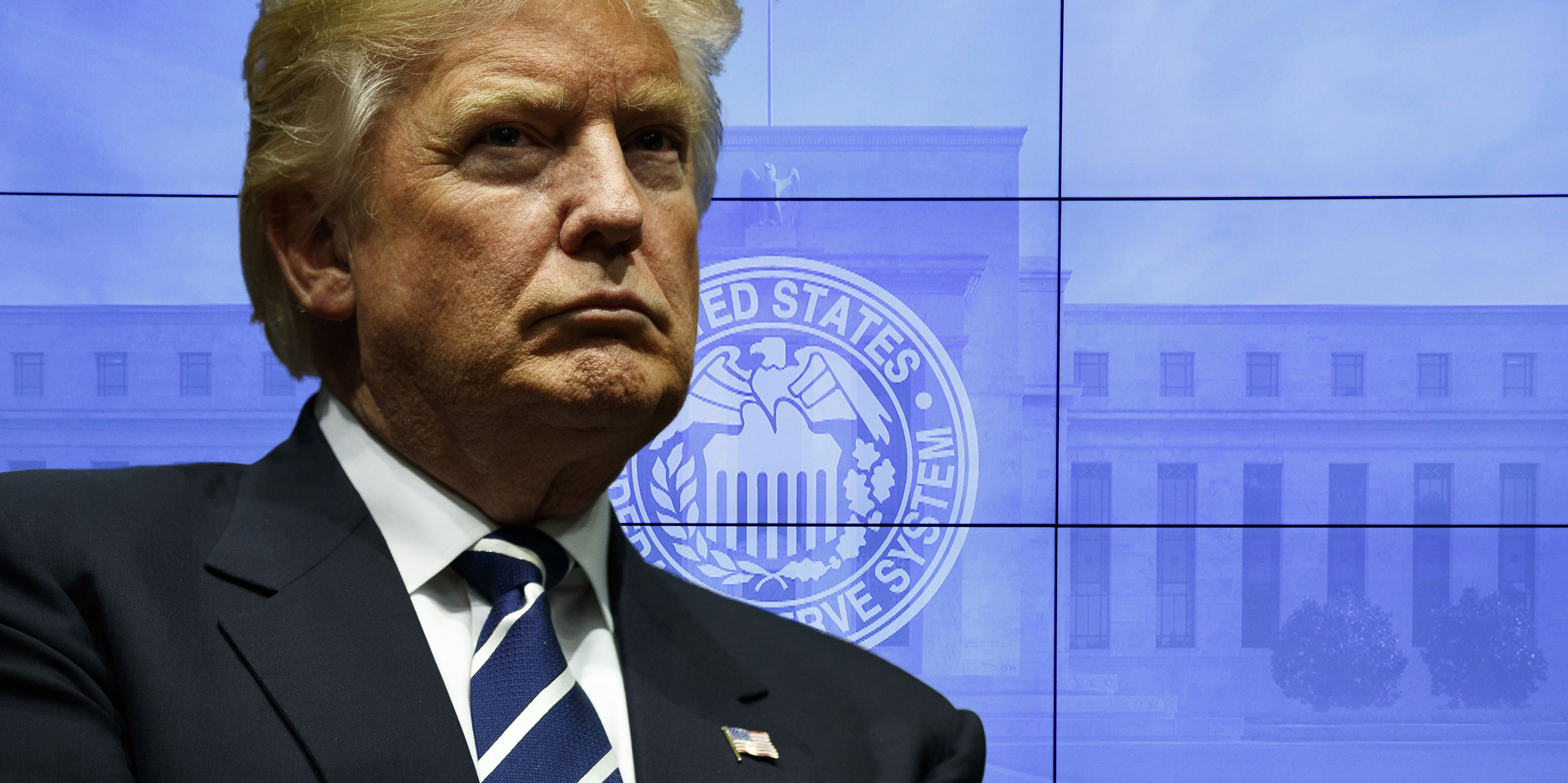How Donald Trump and the Fed might go to war
Trump has promised a jobs boom. A terrific jobs boom. The best jobs boom ever. But right now, the Fed doesn't actually want a jobs boom.


After a year of will-they-or-won't-they false starts, the Federal Reserve hiked interest rates yesterday. It was a modest increase of just 0.25 percentage points, and the first hike since last December. Nonetheless, the decision also ratcheted up the chances of a showdown between Fed officials and President-elect Trump.
Here's the deal: Trump has promised a jobs boom. A terrific jobs boom. The best jobs boom ever. But right now, the Fed doesn't actually want a jobs boom.
The basic logic undergirding monetary policy says that when the economy creates too many jobs, workers get too much bargaining power to demand wage increases, and that bleeds into price increases — which gives us inflation. That's why the Fed hikes interest rates: To slow down job growth, and cool off the wage-price spiral.
The Week
Escape your echo chamber. Get the facts behind the news, plus analysis from multiple perspectives.

Sign up for The Week's Free Newsletters
From our morning news briefing to a weekly Good News Newsletter, get the best of The Week delivered directly to your inbox.
From our morning news briefing to a weekly Good News Newsletter, get the best of The Week delivered directly to your inbox.
With unemployment at 4.6 percent, the Fed is already skittish — hence yesterday's rate hike. Trump's promise of a jobs boom with unemployment already that low could throw Fed officials into a panic. Then they'd hike rates even more and faster, and Trump's jobs boom wouldn't be so terrific anymore.
Here are the key questions that will decide how this plays out:
1. Will Trump actually get his jobs boom? Markets and observers tend to take Trump at his word here. But the actual content of his agenda recommends skepticism. Trump's tax cuts for the rich and corporate-graft infrastructure plan would waste much of their stimulative potential. Passing Paul Ryan's budget and gutting ObamaCare would suck acres of money out of the economy, and wreck the livelihoods of the white working-class voters who gave Trump his critical victory. In which case, there's no jobs boom, the Fed doesn't freak out, and the showdown doesn't materialize.
But this is Trump we're talking about. He might reverse course, go the full Bernie Sanders, and drop $1 trillion in direct government spending on the economy. That would be the "reactionary Keynesianism" nightmare scenario where Trump gets his jobs boom, solidifies his political popularity, and legitimizes the rest of his agenda of tax cuts, deregulation, plutocracy, and white nationalism. In which case, the showdown with the Fed commences.
A free daily email with the biggest news stories of the day – and the best features from TheWeek.com
2. What monetary policy does Trump actually support? During the campaign, Trump held nearly every position under the sun on the wisdom of interest rate hikes and whether Janet Yellen is doing a good job or not. Lately though, Trump has settled on the orthodox GOP line: that interest rates should've gone higher a while ago, and that the Fed should be a lot more hawkish about fighting inflation. Which is weird, since if he wants his jobs boom, Trump needs a dovish Fed.
Does he even realize this contradiction? Will he change his mind again? Is he willing to risk a fracture with the Senate GOP over Fed staffing? I have no idea. But the answers matter, because the president and the Senate appoint most of the Fed's governing officials. Trump will get to fill two vacant Fed seats, and he'll have the chance to replace Fed Chair Janet Yellen and Fed Vice-Chair Stanley Fischer in 2018. That gives him enormous sway over the course of monetary policy.
3. So how will Trump react to the consequences of his own actions? Let's say Trump gives the GOP everything they want, and fails to produce a jobs boom. Assuming the economy continues on its current path, the Fed is already planning a series of further interest rate hikes in 2017 and 2018. If Trump gives the GOP more inflation hawks at the Fed, the pace of rate hikes may well speed up.
So when his promised jobs boom doesn't materialize, does Trump turn right around and blame the Fed for his screw up? He certainly doesn't seem above that. Alternatively, if Trump does deliver his jobs boom, but then Fed officials squash it, he'll have even more reason to come after them. Indeed, the scenario under which Trump and the Fed are most likely to get along is where he gets his jobs boom and staffs the Fed with doves. Which also seems to be the least likely possibility.
4. So does Trump respect the Fed's independence? It's a long-standing norm that the Fed should be able to enact monetary policy free of political pressure. But it's just a norm. The Fed was created and given its powers by Congress, and it enjoys its independence by the rest of the government's good graces. Should Trump and the Fed come to loggerheads, does anyone doubt he'd happily run roughshod over that norm?
The Fed's charter allows for the removal of the Fed chair "for cause by the president," but Trump would have to get the courts to go along should he pursue that threat. Another option is just rewriting the Fed's charter to give Trump what he wants, but he'd need Congress to actually pass the legislation. Or Trump could try to intimidate the Fed into taking his preferred course by whipping up public sentiment. (Imagine President Trump leaping into a Twitter flame war with the Fed's account.) So Trump has options, though they're limited.
But here's the really twisted part. In practice, respecting the Fed's independence generally means leaving it alone to be co-opted by big finance — whose priorities tend to be low inflation and keeping American workers as disempowered as possible. The result has been a decades-long bias in Fed policymaking that has done enormous damage to American workers. Since Democrats and liberals have studiously avoided making a political and ideological matter out of monetary policy (though some activists are changing that), the GOP's reactionary inflation hawks are usually the only voices of criticism against the Fed anyone ever hears.
So if President Trump leaves the Fed more fearful of populist backlash against interest rate hikes, he might inadvertently do some good.
Jeff Spross was the economics and business correspondent at TheWeek.com. He was previously a reporter at ThinkProgress.
-
 The best dark romance books to gingerly embrace right now
The best dark romance books to gingerly embrace right nowThe Week Recommends Steamy romances with a dark twist are gaining popularity with readers
-
 The ocean is getting more acidic — and harming sharks’ teeth
The ocean is getting more acidic — and harming sharks’ teethUnder the Radar ‘There is a corrosion effect on sharks’ teeth,’ a study’s author said
-
 6 exquisite homes for skiers
6 exquisite homes for skiersFeature Featuring a Scandinavian-style retreat in Southern California and a Utah abode with a designated ski room
-
 The billionaires’ wealth tax: a catastrophe for California?
The billionaires’ wealth tax: a catastrophe for California?Talking Point Peter Thiel and Larry Page preparing to change state residency
-
 Bari Weiss’ ‘60 Minutes’ scandal is about more than one report
Bari Weiss’ ‘60 Minutes’ scandal is about more than one reportIN THE SPOTLIGHT By blocking an approved segment on a controversial prison holding US deportees in El Salvador, the editor-in-chief of CBS News has become the main story
-
 Has Zohran Mamdani shown the Democrats how to win again?
Has Zohran Mamdani shown the Democrats how to win again?Today’s Big Question New York City mayoral election touted as victory for left-wing populists but moderate centrist wins elsewhere present more complex path for Democratic Party
-
 Millions turn out for anti-Trump ‘No Kings’ rallies
Millions turn out for anti-Trump ‘No Kings’ ralliesSpeed Read An estimated 7 million people participated, 2 million more than at the first ‘No Kings’ protest in June
-
 Ghislaine Maxwell: angling for a Trump pardon
Ghislaine Maxwell: angling for a Trump pardonTalking Point Convicted sex trafficker's testimony could shed new light on president's links to Jeffrey Epstein
-
 The last words and final moments of 40 presidents
The last words and final moments of 40 presidentsThe Explainer Some are eloquent quotes worthy of the holders of the highest office in the nation, and others... aren't
-
 The JFK files: the truth at last?
The JFK files: the truth at last?In The Spotlight More than 64,000 previously classified documents relating the 1963 assassination of John F. Kennedy have been released by the Trump administration
-
 'Seriously, not literally': how should the world take Donald Trump?
'Seriously, not literally': how should the world take Donald Trump?Today's big question White House rhetoric and reality look likely to become increasingly blurred
